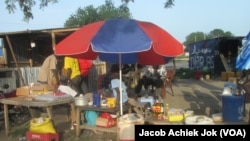When Hassan Sebit Taban shops for food at Marol market in the Jonglei state capital, Bor, he says he is astounded at the high prices and shrinking portion sizes.
Taban remembers how, not too long ago, he used to buy three loaves of bread for one South Sudanese Pound.
"Nowadays, it is only two for one Pound. And they have reduced the size. It was somehow wide before and these days, it is very tiny," he says as he holds up a loaf that is roughly the size of a young child's fist.
Costly commodities
Surging costs of commodities have affected the price of most food items in South Sudan. Everything from flour to cooking oil to onions has gone up in price.
Taban says he has to spend more and more money to buy the same amount of food. In a nearby restaurant, a customer who gave his name only as James agrees with Taban. James says that these days, if you want to eat your fill of fried meat and bread, you have to buy more than one meal.
“If you ask for one order of fried meat, you will see only three pieces on the plate and a small side of tomatoes. What you have to do is order three plates and then you pool them together,” he said.
But even one plate of fried meat is out of reach of most South Sudanese. In Bor, the dish costs around 10 South Sudanese Pounds, but many people in the town live on less than a dollar a day, which, at the official exchange rate, is around three South Sudanese Pounds.
Flour up 50 percent
Abdualla Azalrahim owns a bakery in Bor. Azalrahim says he understands why people are upset about the rising price of food, especially bread. But he says he can't do anything to remedy the situation.
Azalrahim says the price of a fifty kilogram bag of flour has increased sharply since the middle of last year, when it cost 250 South Sudanese Pounds.
“It is now between 360 and 375 South Sudanese Pounds. This cuts into our profit margin. We have had to reduce the size of the bread we sell,” he says.
U.S. dollar
Taban says traders have told him the skyrocketing bread prices are the result of the South Sudanese Pound losing value against the United States dollar. Most of the food sold in South Sudan is imported or made from imported raw materials. Merchants pay for the imported foods in dollars. On the black market in Bor, merchants need 7.5 South Sudanese Pounds to buy one U.S. dollar. At a commercial bank in Juba, merchants would pay 3.2 South Sudanese Pounds for one dollar. But only a few traders from Bor can travel the 190 kilometers to Juba to buy dollars at the more favorable exchange rate.
Jonglei state Chamber of Commerce member Abraham Chol Keech says the solution is to grow food locally instead of importing it from neighboring countries. But, insecurity is rampant in rural areas, and he says that must improve so that local famers can produce enough food to feed residents of Bor.
South Sudan has been embroiled in internal conflict since December 2013, when a political row between President Salva Kiir and his former vice president, Riek Machar, came to a head. The fighting quickly spread to seven of South Sudan's 10 states. For the last 16 months, clashes have been concentrated for the most part in Unity and Upper Nile states, with sporadic outbreaks of violence in Jonglei state.
Nearly two million people have been forced to flee their homes, livestock migration patterns have been disrupted, and many farms have been abandoned because of the fighting.
Last week, the U.N. Humanitarian Coordinator for South Sudan, Toby Lanzer, said the number of South Sudanese who are struggling to find enough to eat could rise if the ongoing conflict continues to disrupt livestock migration, farming, and trade routes. The United Nations has said 2.5 million South Sudanese are currently food insecure because of the violence.
"It is vital that the people in South Sudan are able to move freely to access their land, plant crops, tend to their livestock and trade without fear of violence," Lanzer said.
Until the fighting stops and economic stability is restored, Taban says South Sudanese will have to grit their teeth and dig even deeper into their pockets when they go to market to buy their daily bread.








